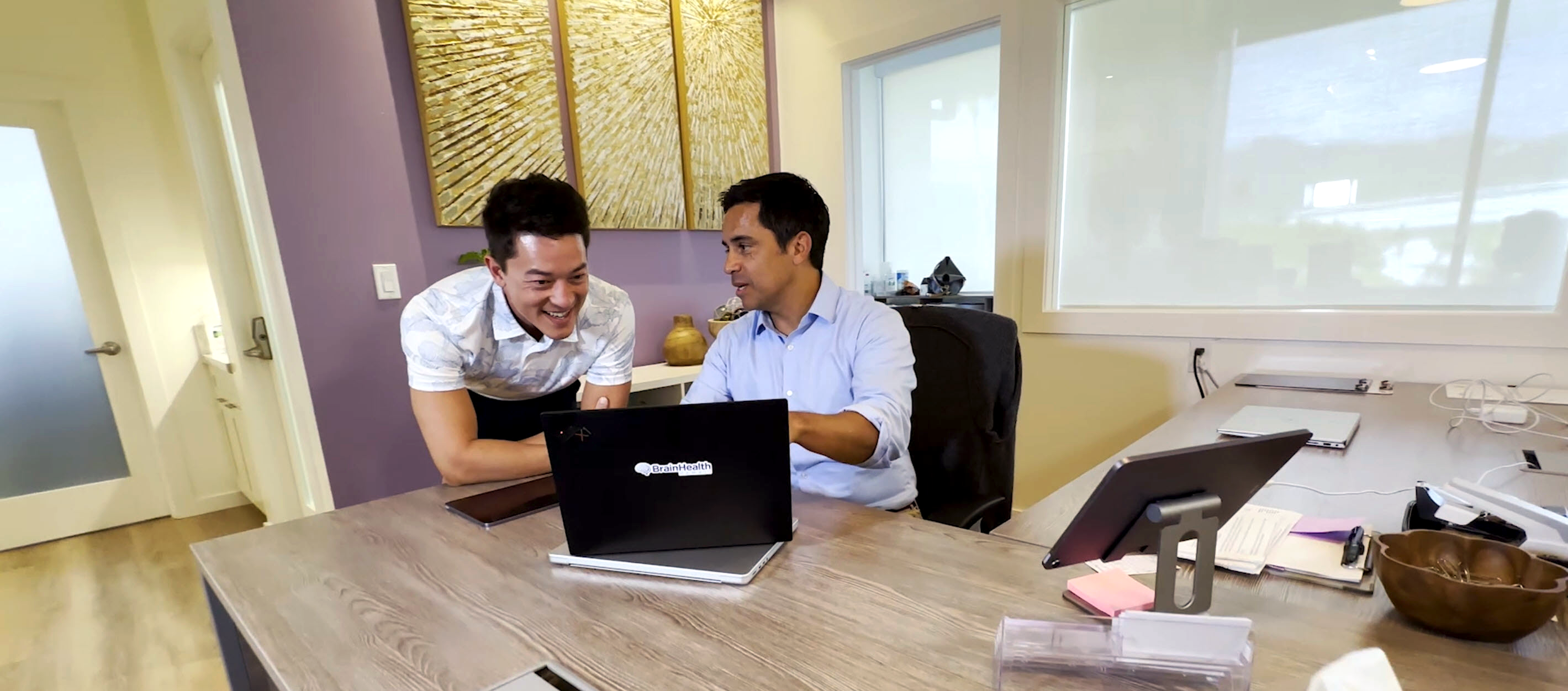
Our Methodology
Functional Brain Assessment
Our Functional Brain Assessment (FBA) allows us to visualize & gain an understanding of what is happening in your brain, where it is happening and if there are irregularities in brain rhythm.
While typical brain imaging techniques such as MRI’s, CT scans and X-rays measure brain structure, the technique used at Brain Health Hawaii measures functional connection and synchrony within the brain. We use your FBA, or ‘brain map’, to identify the condition and efficiency of the neural networks in your brain that may be causing symptoms or dysfunction.
Much like the electrical system in the heart, the brain can be in a state of arrhythmia associated with symptoms. Brain arrhythmia is at the root of many conditions and we have seen it can be understood & treated.
Brain Enhancement & Restoration
We will assess your unique brain and condition with the focus on helping you achieve optimal health and performance.
The most common benefit of a complete course of treatment our clients experience are:
- increased sleep quality
- increased attention, concentration, focus
- increased emotional stability
- increased mental stamina
- reduced anxiety
Every person’s brain is unique and results will vary depending on your presentation and history. We are building on decades of science and a treatment approach that has helped thousands.
Peak Performance
Brain Health Hawaii can help you enhance your performance. Many professional & collegiate athletes, military operators and CEO’s experience peak performance as a result of our safe, drug-free, pain-free brain enhancement.
Peak performance is possible when:
- You sleep better
- You recover faster
- You think more clearly
Whether you are a corporate executive, entrepreneur, medical student, attorney, engineer or competitive athlete, optimizing brain connection and efficiency can enhance mental & physical performance, memory, decision-making and restore proper sleep rhythm without the use of medication.
Personalized Approach to Brain Health
“I understood the logic of the process and treatment; my wife was my early adopter, and I just followed orders. But honestly, the results were unexpected. Having no known trauma or injury, except for many years of fairly high stress, I figured I might sleep better. Instead my thinking is relaxed and focused. My level of mental athleticism is much higher. Stamina, agility, quickness, vision, it makes me happy to use my brain. Any useful wisdom gained over the years is now complemented by youthful mental energy and flexibility. (I actually hear better too. So music sounds better. But, per my wife, my selective hearing has not improved.) Now I have the responsibility to manage this renewed capability. An invigorating challenge and opportunity. Thank you BHH.” ~G.Y. October 2021
Treatment is safe, painless and non-invasive and typically takes 25-35 minutes per session, Monday through Friday, for 6-8 weeks. The goal of treatment is to improve brain health, rhythm and functioning as measured by neurocognitive scores, brainwave analysis and mapping, and subjective report of the patient.
Transcranial Magnetic Stimulation is a non-invasive, drug-free brain treatment that is FDA cleared for treatment of Depression, Migraine headaches, and Obsessive-Compulsive Disorder. The neuromodulation equipment used by Dr. Keifer has been cleared by the FDA, and may be used off label for other symptoms and conditions in the practice of medicine. At leading medical centers on he mainland & ongoing phase 3 trials in the U.S., and clinical practice in Europe, TMS is demonstrating measurable positive outcomes in patients suffering from PTSD, mood disorders, autism, chemo-brain, postpartum depression, concussion, and other neurologic conditions.
Most current treatments in neurology and mental health involve pharmaceuticals and largely rely on a one size fits all approach. If you are looking for a more personalized approach to your health contact Dr. Keifer. We will individualize your treatment targeting your unique brain and what it needs to restore health and optimize performance.
We Accept the Following Health Insurance Plans
HMSA (PPO, HMO, Quest, Akamai Advantage)
UHA
HMAA
Anthem
Blue Cross Blue Shield
UnitedHealthcare
Cigna
Aetna
TriCare
TriWest
Medicare
Treatment for you or your loved one may be covered by your insurance plan. Coverage varies by carrier.
Please verify eligibility with your plan and call our office if you have any questions.

